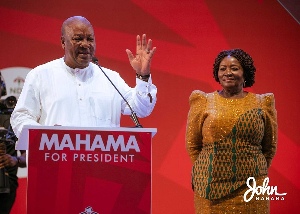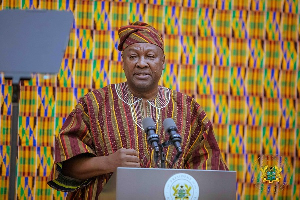In an election year all sorts of stories are told, truths, half-truths, lies and damned lies all in the name of party politics.
On 9th June 2012 a Daily Guide’s article was posted on Ghanaweb. Its heading was “Minister fingered in bloody conflict”. In the article the paper accused the Northern Regional Minister Hon. Moses Bukari Mabengbah of aiding the Kombas in a clash with their neighbors the Bimobas in Kpemali a farming community in the Bunkpurugu/Yunyoo District in the Northern Region. Without an iota of sustenance the newspaper claimed the Regional Minister’s sins were that he was a Konkomba (not a Komba), the Regional Minister and Head of the Northern Regional Security Council at the time of the conflict.
Ghanaweb of Wednesday October 24, 2012 carried a story titled “Mahama's Swiss Bank Cash – 170 million dollars. The article alleged that President John Mahama and his wife had deposited 170 million dollars into foreign bank accounts in Switzerland and Luxembourg and that the World Bank was investigating the president and his wife for embezzlement. The story purported to have come from Associated Press and written by Pierre Wimhoven has never been authenticated and can only traced back to Ghanaian sources.
On Saturday, 24th March 2012 The Herald reported that Dr. Bawumai had abandoned his wife Samira and that she was now together with a GIMPA course mate. The paper claimed that “reliable information from family sources” had confirmed the estrangement.
Given the perceived trust people have in the media few people often take a second look at the state of seminal issues such as a trustworthy press. On the contrary given the voraciousness of the media many are beginning to question the trust we have in our media. Without holding brief for the Regional Minister I wish to look at the role of the Fourth Estate in our dear Ghana. Liberal theorists have always argued that the existence of a free press is essential in the process of democratization because they (press) contribute to an informed public. They highlight cases thereby strengthening responsiveness of governments. Being watchdogs of the powerful, journalists must help promote government transparency and accountability by pointing out policy failures, maladministration, scandals and corruption in high places like the judiciary. And for this reason the UN in 1948 adopted the Universal declaration of Human Rights and the African Charter on Human and Peoples’ Rights to certify that the guarantee of freedom of expression and information is a basic human right.
Freedom of expression and free press as the foundations for a strong democracy enjoins the media to feed their audience with right information to make decisions. Their task is to use that freedom to improve the everyday welfare of the citizens. But what we get out of this freedom is hoax stories. I remember a journalist during President Kufour’s regime once said that he wrote his stories long before the events happened. Simply irresponsible and absolute abuse of the freedom! The Daily Guide’s tagging of the Regional Minister to the Kpemali conflict was equally thoughtless if not intentional. With the scramble for government positions which appointee in his right sense, will within a few months to elections, rock the boat of his own party? Hon. Moses Bukari is not stupid. In fact conflicts in the region have been on the low side during his stewardship. Amid the daily chase for a big scoop, the Daily Guide should not forget its role as the fourth estate. The responsible media that wants to stop ethnic conflicts especially what is now called the Northern Conflicts must look at the conflicts outside and inside them. There is always an underlying cause. History of the Bimoba-Komba conflicts dates back to 1985.
As watchdogs of the powerful it will be mild to assert that Ghana’s media has woefully failed the Ghanaian public. They are not scrutinizing the decision-makers hard enough. They are not scrutinizing policy failures hard enough. They are not scrutinizing scandals and corruption in judiciary hard enough. In most democracies the murder of a citizen is resolved in the shortest possible time. In Ghana the constitution protects the rights of the individual. Government officials swear to abide by the constitution but they never do. Since 2002 the massacre of the Ya Naa and over 40 others is still a mystery. Government officials are tight lipped. Even President John Kufour whose government preached due process and he himself described the murder of the King of Dagbon as a "heinous crime" could not tell Ghanaians what happened in Yendi. The watchdog charged with highlighting maladministration and lapses seems to have ostensibly been chained to the tether of stomach politics here.
Anas who has become a household name will remain a “one-man show” insofar as his media kith and kin prefer to go to bed with political parties to supplementing his efforts. Benedicta Baka posits that “some media houses have become tools for propaganda that politicians waste no time to use”.
The Mills administration instituted toll on the Accra-Tema Motorway and bridges. Companies including a Church were tasked to collect the money. You and I know that most of these moneys are still unpaid to government. Where is the media here? Where is the Parliament here? Where are you Ghana media to tell the people what to think about?
With the litany of judgment debts our country, in recent years has been long-established to be full of people who settle non-existent judgment debts.
Such important public issues should be sumptuous meals for an engaging media. How can the media forget that agenda setting is one of its vital roles? How can they forget that there is a correlation between the rate at which media cover a story and the extent to which people think that a story is important? (Shaw an McCombs 1977). As the Fourth Estate it is preposterous to think that they prefer to remain gate keepers.
UNINTENDED CONSEQUENCES
Another domain that the Ghanaian media seriously overlooks in reporting is the unintended consequence of their actions. From all intensions it is clear that the Daily Guide in the Kpemali story was orchestrating a smear campaign against the Regional Minister and his party in an election year.
But fact is that today there is an emerging generation of pensioners especially from the noble profession, teaching. After several years of waiting and after several trips to Accra “to work on their pensions” this generation invests their entire pensions in building their homes. Nice houses and homes are always the first point of attack in these conflicts so the unintended consequence of such insensitive moral panics by the media will and can only strengthen the desire to buy arms to protect their homes and property. And who can blame them? Arms trade, we know, is already a booming industry in conflict areas. Ghana described as an oasis of stability in a region ravaged by intertribal and cross border-conflicts, should heed a warning that danger is staring us in the face. Access to arms has never been easier than now. It will be naive to think that China’s economic expansion in Africa ends with only the variety of cheap Chinese products we buy in the open market without arms. According to the Stockholm International Peace Research Institute (SIPRI) China and Ukraine, between 2006 and 2012 accounted for the greatest export of arms to Africa South of the Sahara. It is estimated that 18% of Ukraine’s arms exports during 2005-2009 went to sub-Saharan Africa. We know the state of affairs in our western neighbours Ivory Coast, Liberia and Sierra Leone. Ivory Coast has since 2004 been under EU’s arms embargo.
Commenting on the President Mahama’s Swiss bank account story Kofi Ata of London quzzed, “But why do Ghanaians go to that extent of fabricating very damaging allegations against their leaders? Are these also part of the new found democracy and freedom of speech?” (Kofi Ata, Feature Article Modern Ghana, 26th October 2012).
That such fabrications could damage Ghana’s international image and scare away investors is secondary once it serves parochial interest which more often than not short term political gains.
I am sure Edmund Burke would be wondering in his grave what has happened to Ghana’s Fourth Estate’s role as classic checks and balances domain. With all these facts the value of the Ghanaian press will become irrelevant if they will not take up issues that have longer term structural value in improving the welfare of the Ghanaian. Daily Guide would NOT have intended aiding arms trade but sadly that is a probable flip of their action.
Kombat, Kpamka Elijah
Opinions of Thursday, 15 November 2012
Columnist: Kombat, Kpamka Elijah














